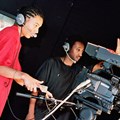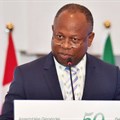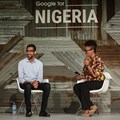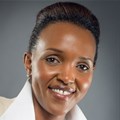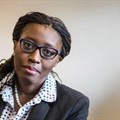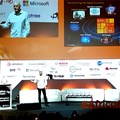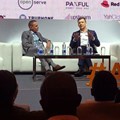#AfricaCom: Searching for the next 'M-Pesa unicorn', skilling Generation Disrupted

There was applause from the #AfricaCom headline keynote audience on noting the all-female panel members for the discussion on using emerging tech to support a vibrant, secure digital economy. Moderator Terryanne Chebet is currently general manager at Metropol TV, the first Kenyan 24-hour business news channel, which launched earlier this year.
Giving young people new entrepreneurial heroes to look up to
Chebet commented at the time that Metropol TV offered new dawn and a breath of fresh air to business reporting in the country, as business journalism has grown beyond the five-minute segments we were used to, as demand for information rises.We are launching Metropol TV and we hope to deliver business news that will empower our audiences to make sound economic decisions. Through our programming, young people will get new heroes, like wealth creators, entrepreneurs and people of integrity.
But it’s important to recognise that’s just one part of the solution. We shouldn’t focus on any single aspect independently of understanding the rest of the value chain.
Africa's most wanted: Infrastructure and jobs
Wainaina commented that as the infrastructure fund for Africa, Africa50 is funded by African governments in a way that a purely commercial organisation would not be able to, which means they bring together the players in a unique way.
Chebet used this as a segue to introduce the topic of a pan-African digital strategy, to which Juliet Ehimuan, country director for Google Nigeria said technology would play an important role in accelerating growth, as African’s biggest challenges simply won’t be solved without further innovation.
We will come by those solutions by working with different partners and pillars, in order to energise the digital value chain.
Charlene Verzmoter, head of philanthropy at Microsoft, said she’s excited about the fourth industrial revolution or 4IR as technology is at the heart of the revolution.
Industrial revolutions = societal change. Are we ready?
There was rapid societal change with the first three industrial revolutions, but Verzmoter says there’s never been as much as what we are seeing currently.
When girls and women are well-educated, all society is well-educated. A woman is a mom, and a mom is like a book to her child. Moreover, companies need female leaders. We make them develop, generate value and we instill good management and leadership practices#WomenEmpowerment pic.twitter.com/cy5MTnLE7b
— Isabel Dos Santos (@isabelaangola) November 21, 2019
Isabel dos Santos, chair of Unitel in Angola, congratulated Chebet for moderating an all-female panel in the tech realm, stating that she’s often been the only female voice on discussion panels in the past.
Dos Santos spoke of her experience from the mobile operating company perspective and how it was already radically different from most tech industries back in the day.
Mobile in Africa: Beyond voice
As Africa is mobile-first, and in some places mobile-only, we're already going ‘beyond voice’ when it comes to mobile. It’s also about delivering data at high speed, as data can really change the face of business.
Chebet then asked the panel what infrastructure is required to make this leapfrog move.
Wainaina said we need a two-pronged approach. The current focus is on putting lots of investment into broadband and access to connectivity, which is crucial, but said Africa50’s aim is also to work with governments in public-private partnership (PPP) frameworks, as this is the best vehicle to attract international investors.
We recognise that it’s a slow process in the rural and under-served areas, so need to start crowdsourcing solutions.
Within this innovation challenge, Wainaina says that once we get the solutions, we can work with the winners to finance them and help to scale.
They’re currently piloting a project in Rwanda that’s funded by 28 countries, to help with the hardcore infrastructure as well as last-mile connectivity and modular solutions.
Scale beyond a drop in the ocean
Speaking on the topic of scale, Ehimuan said there are many exciting initiatives where entrepreneurs are doing big things, but on a continent with more than 1.2bn people, that effort can seem like a drop in the ocean.
That’s why she says we need to think of scale early, in the design phase, and to scale around the rate of development. That’s where the country’s numerous tech and entrepreneurial hubs come in.
When it comes to existing developments, remember that Africa is mobile-first, and in some places mobile-only, so any solutions must be mobile compatible.We also need to consider leveraging communities to scale, especially on topics like digital literacy.
If we come together and collaborate on this, there’s potential to expand the pie.
There’s no denying that basic survival is a reality for many when it comes to earning a living, so innovating around business models for the non-formal sector as well as in fintech to enhance financial inclusion for the unbanked is a good place to start.
Digital inclusion, leave no one behind
There are also spots of radical advancement we can learn from, such as the use of machine learning in Tanzanian agriculture, for remote diagnosis of crop disease.
On intentionality and the need to leave no one behind, Verzmoter says mobile penetration remains largely in urban areas.
That’s why Microsoft has undertaken various programmes to empower communities more effectively.
These include the Microsoft Cloud for Global Good, with a focus on the realms of earth, accessibility, aid and heritage.
The Cloud for Global Good is about creating a trusted, responsible, and inclusive cloud, based on policy recommendations for governments, industry and civil society to help ensure that the opportunities of technology are evenly shared and that challenges facing society are identified early and practical solutions applied.On building businesses for tomorrow, Chebet said that in her time as a journalist in Kenya, much was done to celebrate the launch of M-Pesa, now a decade old. So how do we build a M-Pesa for tomorrow?
Dos Santos said that we’re all looking for that unicorn while struggling with how to transform traditional businesses for the digital economy.
What does the digital economy really mean in Africa?
Does that mean digitising all the processes in our companies? Because all businesses need a chance to thrive, not just those in urban areas with established financial centres, as innovation is also changing traditional farming communities.
That said, infrastructure remains a top challenge, as does digital skill transfer and innovation of the business model overall.
Once this is all in place, imagine the true impact, as you’ll no longer need to visit a library or pay a hefty fee for a physical textbook that may take months to arrive. Instead, you can make a digital payment and download the book instantly.
Trade barriers are going down, which means we can communicate products much wider than before. This means e-commerce will be a huge driving force on the move towards Africa’s digital economy.
Chebet also spoke of the future of work and whether Africa is doing enough to equip the youth with those all-important digital skills.
How do we prepare our young people for tomorrow, when 40% of the jobs that exist today won’t exist in the next decade?We need to collaborate with education departments and communities, to get that digital skills training in place.
Don’t forget the jobs of today when focusing on jobs of tomorrow
IDC research shows top skills needed in the future will be innovation, collaboration, and problem-solving.
But Dos Santos said to also think of the skills required in the jobs of today, as tomorrow’s workers are today’s babies, and their parents need jobs because, without income, they just can’t provide the right level of care, nourishment and education.
Ehimuan agrees, adding that there’s lots of talent across Africa, much of which just needs exposure.
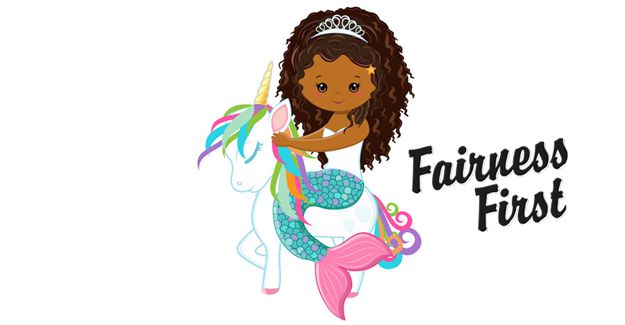
She says that the introduction of concepts of computer safety and Stem subjects in education is crucial to unlocking the talent and potential that exists.
Unfortunately, there’s been more talk than action on a pan-African digital strategy and agenda so far, but Wainaina says not to lose hope as ICT ministers are talking more than ever before, with groups like Africa50, which serves as a commercial company representing the individual countries, bringing them together.
Creating a positive environment for PPPs
She adds that we can’t connect our 54 non-viable ‘chunks of Africa’ into something powerful simply by optimising our digital connection as one.
We need to look at how best to bring in the private sector, as they will invest where they see a return and will bring more money into the continent.
That’s why Wainaina says PPPs can make a difference. Most governments aren’t quite as business savvy as they should be.
Business is driven by profit but in a good enough market, you need contractual security before you can commit to that, as well as an understanding of current market conditions and the ability to foresee what that market will be like down the road.
These uncertainties are the current challenges we need to overcome in order to create a positive environment for PPPs.
A big PPP will benefit the continent but Africa50 is a strategic minority, merely catalysing the private sector, and working on government enablement.
But let’s not try to run before we can walk, as Dos Santos points out that the current African population of 1.2bn is set to double to 2.4bn by 2050, and you just can’t have 5G if you don’t even have electricity.
That’s why Dos Santos would like to see what happened in the telecom sector happen in the energy sector.
We need to be aware of deepening the digital divide and further disrupting 'generation disrupted'.
Predictions on Africa’s next digital decade
Responding to Chebet’s question of where Africa will be in the next 5 to 10 years from a digital perspective, Dos Santos said she expects to see the rise of African champions and big companies in this space. We haven’t yet seen the Amazon or Alibaba of Africa.
Verzmoter has hope in the potential for growth but says a collaborative approach is needed to accelerate this. We need to learn from one another, as we are all facing similar issues and can scale and show impact by sharing stories.
Charlene Verzmoter, Head of Philanthropy at Microsoft pic.twitter.com/SjZHFFEgfd
— Kutlwano Vanessa Mofolo (@puremagnolia2) November 13, 2019
Wainaina is similarly excited about tech innovation, as she says we can only solve the continent’s tech problems with solutions that are specifically designed for what we need.
There’s no doubt that we need to bring the talent, capital and technology together in ways that work, as we’re just not scaling fast enough right now.
We need to find each other, and for the collaboration to go beyond business goals. That implies business mode innovation and the creation of a space where entrepreneurs also make money at scale. Watch this space...
Keep an eye on our AfricaCom special section and follow the latest updates on the #AfricaCom2019 hashtag.










